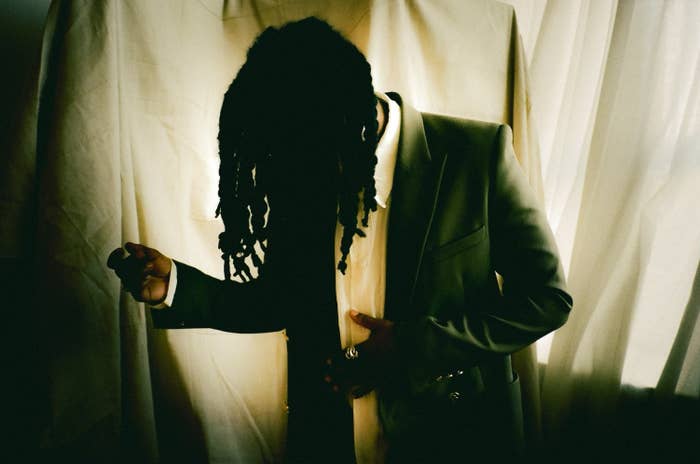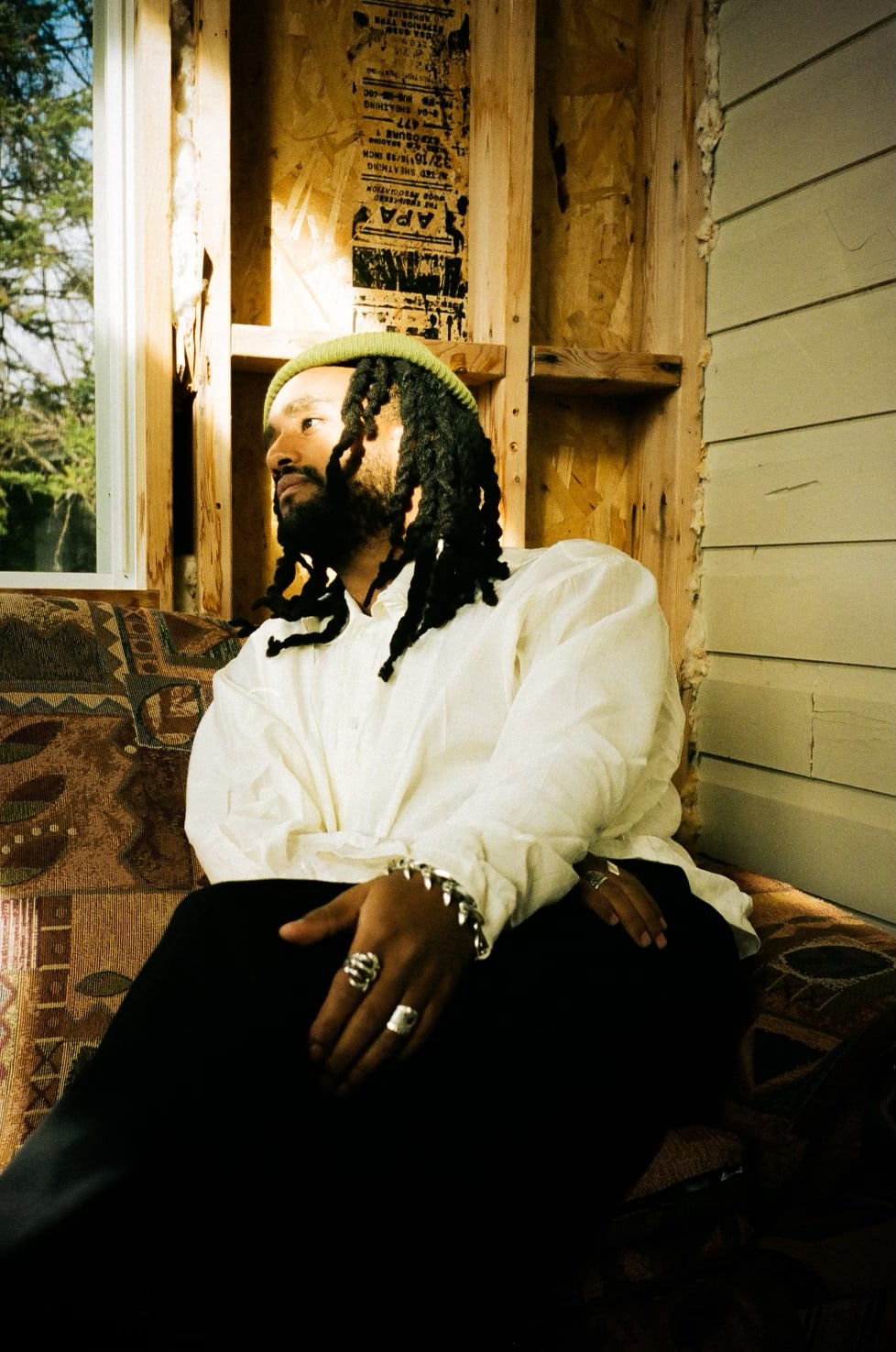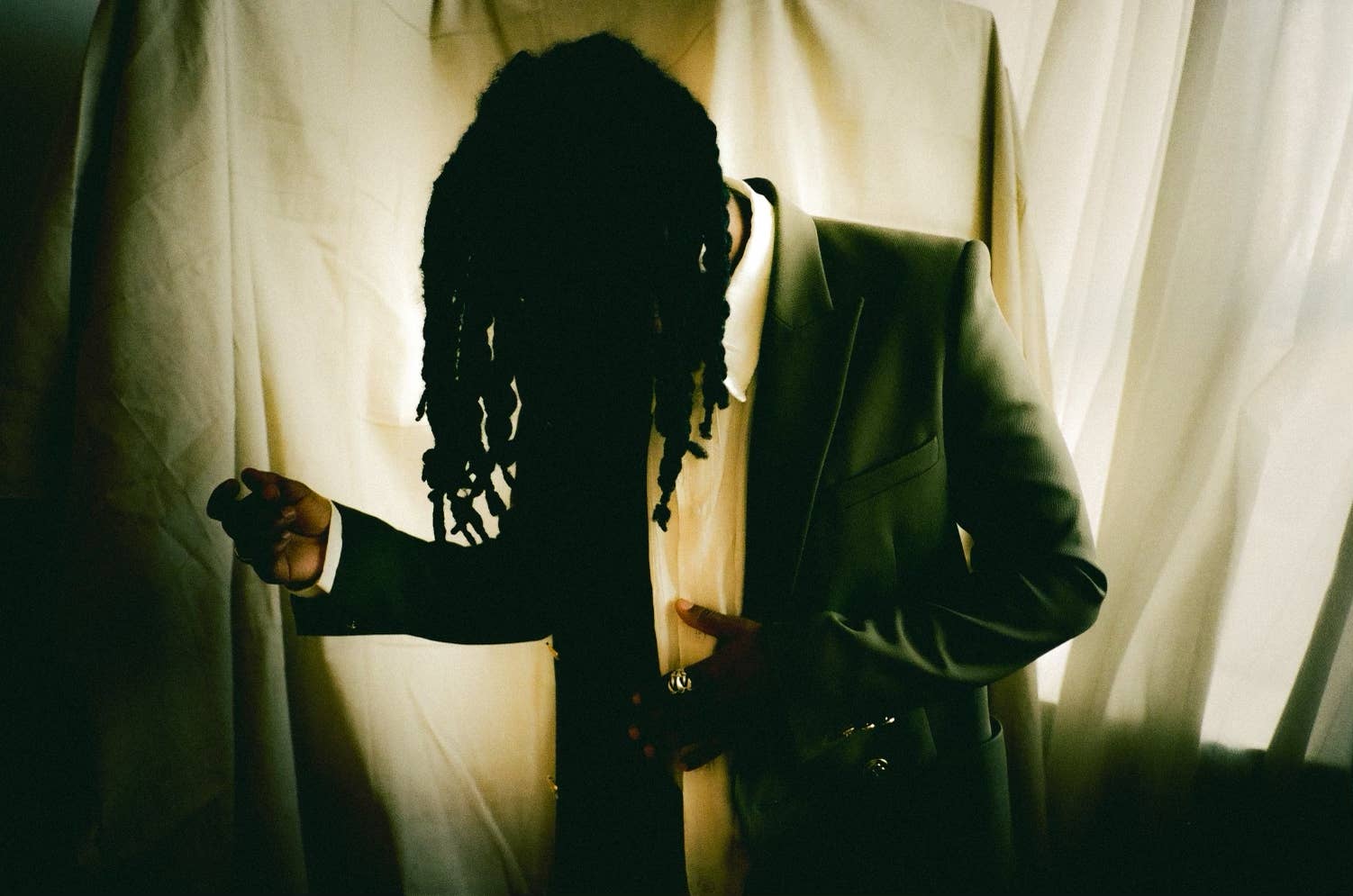
Chiiild is a product of his environment. When the pandemic kicked in, the Los Angeles-via-Montreal artist locked himself in his house and made his last album Hope For Sale as an act of introspection and trying to be the light in dark times. On his latest project Better Luck In the Next Life, Chiiild flipped the script and tried making the album he would have wanted to listen to on his commute to and from school growing up.
His commuting playlist consisted of alternative artists like Incubus and Linkin Park, but also mid 2000s hip-hop and R&B heavyweights like Mario, Omarion, and Fabolous. What attracted him specifically was the weirdness behind the production.
“I’m just kind of a big fan of interesting musical decisions that sometimes come out of ignorance,” Chiiild explained. “I’m not really into like smart music, you know? I love that ignorant savant type of stuff [...]”
Replicating the weirdness on Better Luck In The Next Life took time. Chiiild could spend days or weeks at a time tinkering with a song he thought might have been complete. Sometimes he would rewrite certain lines or verses with the hopes of tapping into a more honest side of himself.
“I’ll record the song, and then I’ll find a more honest way to rewrite a certain line. I love to be able to print out the lyrics and just not even listen to the music and just read it. I think it also equally tells the story.”
Taking his time, Chiiild also managed to secure some a feature from Charlotte Cardin, one of Quebec’s biggest artists to flesh out highlight track “I Hope I Packed A Parachute.” Even beyond the album’s surface, Montreal creatives permeate the album. Most of the people Chiild work with hail from his hometown, showing that home, even thousands of kilometres away, still influences his craft.

In Complex Canada’s interview with Chiiild, the Montreal artist speaks about his creative process, what songs he was most proud of and what he thinks of the current wave of Montreal artists blossoming out of the city.
How does it feel having your new album come out?
It feels kind of surreal. I mean, I’m excited to listen to it. You know? It sounds different when it’s out in the world. So yeah, I’m excited to just kind of put it on as a fan and just relive it.
How does it feel listening to it as a fan versus listening to it as its creator?
I think I’m just able to turn off a big part of like of my brain, which is my producer’s brain. There’s so many details in the music that I can’t really point out. I’ll think about it in theory, that when you get to spend some time away from it and get to re-listen to it, especially in a different setting, it’ll be different. But outside of the studio, outside on my AirPods or just driving, it just becomes like a bit of a nostalgic thing. Where you’re like “Oh yeah, that’s true. We did do that thing. That’s really cool.” And you just yet get to enjoy it.

How did ‘Better Luck in the Next Life’ come to be?
I’m such a product in my environment and Hope For Sale was really a product of that time. You know, you’re locked in your house. You’re feeling introspective. You’re just trying to be the light in general. So much of it is so subconscious. I think when you’re really trying to create something special, you don’t plan it all out. A lot of it happens to you in the process, and you recognize it and you’re like, “Oh, interesting, that was a mistake, but that’s kind of beautiful the way that it landed” and so it’s not really a precise art more than it is like just a feeling. And with this one, it was, “You know what, let me tune out all the noise and just make the album I would want to listen to on my way to school” when I was in high school. On the way to school, I would just be listening to music and I asked myself, ‘what would be the album that sounded like a mash-up of all the records I listened on the way to school.’
What was on your playlist when you commuted?
It varied but there was like Incubus, there was Linkin Park, especially Collision Course, which was really interesting. And then also Mario’s sophomore album, Omarion’s records, Fabolous’ Street Dreams. That was really for the production, it had such a weird tone to the production on that that I thought was really cool. I’m just kind of a big fan of interesting musical decisions that sometimes come out of ignorance. I’m not really into like smart music, you know? I love that ignorant savant type of stuff where you took this sound and tuned it to a place where it was pleasing, but you don’t realize that you tuned it to the seventh and the bass is playing. Some people might do that on purpose. And that’s cool. That doesn’t really get me. It’s more like when you kind of slip and fall and land really nicely. That’s the type of music that speaks to me. I’m not really a fiction writer, nor do I really like fiction novels, so it’s like I’m just writing from a personal point of view, painting how I feel in a broad sense or being specific at times.
How difficult is it to tap into your more honest side?
It’s kind of a momentum thing. And so much of it has to deal with which subject, what time, where you’re at in your mood. The songs usually manifest themselves over time, not just an eight-hour session. So there’s a lot of tuning and tweaking along the way, then sometimes I’ll record the song, and then I’ll find a more honest way to rewrite a certain line. I love to be able to print out the lyrics, not even listen to the music, and just read it. I think it also equally tells the story.
Which songs were the most impactful for you to get down on paper?
“You Get Me” kind of wrote itself in one long sentence. I was in Nashville with my friend Taylor Parx and a few other friends and I had this idea of, getting some of that twang into this record like it’s, again, being a product of your environment.. Something different that wasn’t LA or Montreal. I was on bass and we were just bouncing around ideas. And then all of a sudden, that whole framework revealed itself with the words and then, a month or two later when I finally recorded, just a few lines ended up changing. Some of them are a bit more of a mouthful.
What other songs off the album were you most proud of?
The album has songs that represent different parts of what I like and what I want in the world. “Good for Now” to me is one of my favourites. Probably the one I listen to the most. When when I mixed “Good for Now” I had all the spatial sounds mixed really high in the record and I loved it so much that I went back and remixed all the other songs and turned up all the spatial effects.” There’s a part of me that tried to tone it down. But then as you start to assume your identity in the space, you start saying, “What is it what makes this record in this project special?” So why would I tone that down?
“Hell and High Water,” I really love that. I’ve had that song in progress for a long time, but I never felt like there was this “right” kind of album. I’m really proud of that song as well because it’s got a certain brittle and quiet energy about it. I love that song and Alina [Baraz] and Caitlyn [Scarlett] just completely slay.
Charlotte Cardin is also one of the biggest artists coming out of Quebec. How did that come together?
If you look at the credits on all of the records, most of the people that are involved are from Montreal, and I’ve made it a point to keep the music to friends and family, and just people that are close. Being in Montreal, before moving to LA, there wasn’t that much opportunity to work on creative, like really, really creative projects. And so I kind of have a spot for that.
But more importantly, I met Charlotte at the Junos briefly, and we were fans of each other so we spoke. It was me, her, and JP Saxe. Then she ended up coming to our show at the Jazz Fest, which was really nice of her. We continued the conversation backstage for some time and we kept in contact. I had a version of the song on a drive that I was working on, “I Hope I Packed A Parachute.” It wasn’t exact, but it was pretty close. I shared it with her and asked to see if she had any ideas. She sent me a voice note that ended up being the verse, then she flew to Paris where she recorded her parts and then came back to LA to finish the song.
You directly reference the “Mile-End.” How did the neighbourhood influence you growing up?
There’s a lot happening over there. I think it’s one of the coolest parts of town. Pierre-Luc Rioux, who also worked on this project, he lives right up the block. So it just it just felt like another another kind of nod to the place that we’re from.
How do you feel Montreal compares to other Canadian cities, music-wise?
So I think that’s like a two part answer because there’s the blowing up element and then there’s the connectivity element. I think what makes Toronto and cities like that really special is there’s such an economy around the main artist—at least at the beginnings—that kind of can trickle down whereas in Montreal, it’s not like the biggest artist is enough of an economy for the second biggest artist and the third and the fourth to kind of benefit from. It’s like you have enough for yourself in your art. And that’s kind of where it ends. So I feel like in some ways, it’s not much of a pyramid. It’s more of like a landscape. It’s like, “Oh, there’s something special happening here. There’s something really special happening there.”
And I think there’s an awareness of everyone to a certain degree. But yeah, it feels more disconnected. And from my point of view, granted, I’ve been in LA for a bit so I do keep my eye out. I listen to all the podcasts, I try to pay attention as much as possible to everything that’s happening in Montreal musically because I get so much inspiration from it.
And then the blowing up element. It requires somebody to reach serious height, to be the the centre, the focal point of that community that you’re talking about. Or a community leader on the ground. You can point to like Ruffsound (Loud’s producer) and think of 90 percent of the French rap community. You know, so there’s a connection there. On the English side, it’s pretty new. It’s very very new.
Have you ever planned a return to Montreal to work with the scene there?
My phone line has always been open. I think if you ask people in Montreal that have crossed paths with me, we talk and they can call me at any point for anything. Even just to work out. If you need an active or a passive person for something. I literally just got off a call with someone trying to figure out how to best plug in his microphone. You know, I’m down.
Also, Mike Shabb and Nicholas Craven. I think those guys are the kings of the drumless beat. I think that what they’ve done is truly amazing. And you see that it’s starting to cross over into the States and doing all these projects with rappers all over America. I think it’s dope. But you know what, it really comes down to what I said at the beginning though. Everyone’s comfortable with Drake being at the top of the pyramid. That level of success that he’s achieved is inspiring to everyone. Are you going to put Kaytranada at the top of the pyramid? Does he want to be at the top of the pyramid? It’s such a personal thing. It takes the right human with the right story in the right situation to make that happen.



